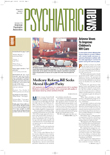Medicare coverage of mental health care would finally achieve parity under new legislation introduced in Congress last month by Rep. Pete Stark (D-Calif.) and Sen. Paul Wellstone (D-Minn.). The bill provides for a major overhaul of Medicare’s existing coverage as well as a controversial expansion of clinicians who would be eligible for reimbursement.
The new legislation, the Medicare Mental Health Modernization Act of 2001 (HR 1522, S 690), strongly supported by the majority of the mental health community, reduces the 50 percent copayment for outpatient mental health care to 20 percent, on a par with other medical benefits, and would eliminate the 190-day lifetime limit on inpatient stays in a free-standing psychiatric facility.
In addition, the bill would significantly expand coverage to include certain “community-based outpatient and intensive residential services.”
New coverage under Medicare Part A for intensive outpatient services would include services that, according to the bill, “would be reasonably expected to improve or maintain the individual’s condition and functional level and to prevent relapse or hospitalization.” Services would include psychiatric rehabilitation, day treatment, and ambulatory detoxification.
The addition of coverage for nonhospital-based community residential programs is another significant advance in benefits. Programs that furnish acute psychiatric or substance abuse services on a 24-hour basis would be covered, including services such as treatment planning and development, medication management, case management, crisis intervention, individual and/or group therapy, and detoxification services.
The bill would require that these services be prescribed by and provided under the supervision of a physician. It also would require a written treatment plan with periodic review by the physician with the staff delivering the services.
“Medicare’s coverage for treatment of mental illness is woefully out of date,” said APA Medical Director Steven Mirin, M.D., in a press release following the bill’s introduction. “APA is pleased with many key features of the Stark-Wellstone legislation that address discriminatory coverage in Medicare today, particularly the 50 percent copayment for psychiatric treatment.”
Mirin also praised other elements of the new bill, including the repeal of the 190- day limit and the addition of coverage for new residential services as well as a requirement in the bill for a study to determine ways in which changes might be made to the strict limits on Medicare mental health services provided to patients with Alzheimer’s disease.
In a letter to both Stark and Wellstone, Mirin wrote that, taken together, “these changes would bring Medicare’s coverage of treatment of mental illness into the 21st century.”
Quality-of-Care Issues
A section of the legislation that has stirred controversy would expand the number of mental health professionals eligible to provide services through Medicare to include clinical social workers, licensed professional mental health counselors, and licensed marriage and family counselors. According to both Wellstone and Stark, this provision was meant to address “a growing shortage of qualified mental health professionals serving older Americans.”
While APA strongly supports most of the bill’s provisions, the addition of marriage and family therapists and mental health counselors as eligible providers of Medicare services raised significant concerns.
“We believe there are quality-of-care issues associated with coverage of marriage and family therapists and the term mental health counselors,” Jay Cutler, J.D., APA’s director of government relations, told Psychiatric News. “We strongly believe that Medicare’s underlying structural discrimination [against psychiatric care] should be addressed before Congress considers adding new providers to the Medicare list.”
Despite these reservations, Cutler reiterated APA’s strong praise for the rest of the bill. “The Stark-Wellstone bill is nothing short of a complete overhaul of Medicare’s antiquated and outmoded coverage of treatment for mental illness,” he said.
APA staff were invited to work closely with Stark’s and Wellstone’s staffs during development of the bill and were successful at recommending changes to the draft legislation. “The new bill is a major step forward from similar legislation introduced in the last Congress,” Cutler said. “We were grateful that many of APA’s suggestions were adopted.”
The bill has won strong support from professional associations and patient-advocacy groups.
Stephen Bartels, M.D., president of the American Association for Geriatric Psychiatry (AAGP), praised the new legislation, saying that “the bill aims to eliminate discrimination toward seniors who seek treatment for Alzheimer’s disease, late-life depression, and other mental illnesses. Arbitrary limitations on mental health services victimize an already vulnerable population and prevent them from having equal access to treatments that work,” Bartels told the press at a briefing announcing the introduction of the bill.
“We [AAGP] have concerns, just as APA does,” Bartels told Psychiatric News. “But what this bill does in getting rid of discriminatory copays and limits on care is such a giant step forward that it needs our full support. With the stipulations, which by the way were hard fought by APA, that marriage and family counselor and mental health counselor services must be referred by a physician, the benefits of this bill far outweigh those concerns.”
Geriatric mental health services are woefully understaffed in this country, said Bartels, who is medical director for the State of New Hampshire Division of Behavioral Health and codirector of the Behavioral Health Policy Institute at Dartmouth Medical School. For so long, he explained, access has been limited or beyond the financial means of most seniors. Expanding the availability of services, Bartels told Psychiatric News, through the use of nonphysician professionals under the supervision of a physician, is an acceptable way to make much needed services more accessible to the millions of senior citizens covered by Medicare.
Also supporting the bill were the National Mental Health Association, National Alliance for the Mentally Ill, and American Psychological Association, among others.
Prospects Look Good
“Policymakers on both sides of the aisle agree that Medicare’s mental health benefits are woefully inadequate and out of date,” said Stark, who believes the prospects for passage of the bill are good. “Yet none of the current Medicare reform proposals specifically addresses mental health. It is time to stop stigmatizing mental illness and restricting access to mental health services that can improve the health and well-being of our nation’s elderly and disabled.”
Wellstone sees only one possible hurdle that could derail passage of the bill—cost. Estimates have placed the cost of the proposed changes at around $1 billion annually.
“But, you know,” Wellstone said, “you either pay a billion up front to help people get better, or you pay numerous billions down the road in both the direct and indirect costs of them not getting well. To me, it’s a rather straightforward dilemma.”
The text of the Medicare Mental Health Modernization Act of 2001 is posted at thomas.loc.gov under HR 1522 or S60. ▪

